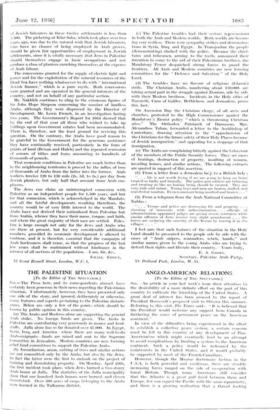THE PALESTINE SITUATION [To the Editor of THE SPECTATOR.]
Sin.—The Press here, and its correspondents abroad, have certainly been generous in their news regarding the Palestinian situation. Unfortunately, however, they have presented only one side of the story, and ignored, deliberately or otherwise, many features and aspects pertaining to the Palestine disturb- ances. Below are only a few of the points which should be known by public opinion in this country.
(a) The Arabs and Moslems alone arc supporting the general Arab strike. No foreign funds are given. The Arabs in Palestine are contributing very generously in money and food- stuffs. Jaffa alone has so far donated over £7,000. In Egypt, Syria, Iraq, and America--where there are many well-to-do Arab emigrants—funds are raised and sent to the Supreme Committee in Jerusalem. Moslem countries are now forming relief fund committees to support the Palestine Arabs.
(b) Incendiarism, arson, cutting of trees and similar actions are not committed only by the Arabs, but also by the Jews. In fact the latter were the first to embark on the project of burning and demolishing property. On Monday, April 20th, the first incident took place, when Jews burned a two-storey Arab house at Jaffa. The statistics of the Jaffa muncipality show that one hundred Arab houses were burned, and eleven demolished. Over 300 acres of crops belonging to the Arabs were burned in the Tulkarem district.
(e) The Palestine troubles had their serious repercussions in both the Arab and Moslem worlds. Both woilds are becon►- ing very restless. There were sympathy strikes and demonstra- tions in Syria, Iraq, and Egypt. In Transjordan the people (demonstrating) clashed with the police. Because the chief- tains and tribesmen, arming to the teeth, announced their intention to come to the aid of their Palestinian brethren, the Mandatory Power despatched strong forces to guard the frontiers. All Arab and Moslem countries are now forming committees for the " Defence and Salvation " of the Holy Land.
(d) The troubles have no flavour of religious (Islamic) strife. The Christian Arabs, numbering about 110.000. are taking actual part in the struggle against Zionism, side by side with their Moslem brethren. Incidents in the Holy cities of Nazareth, Cana of Galilee, Bethlehem, and Jerusalem, prove this fact.
On Ascension Day the Christian clergy, of all sects and churches, protested to the High Commissioner against the Mandatory's Zionist policy " which is threatening Christian sites." The Orthodox Patriarch of Damascus. Mgr. Alexandros Tatum, forwarded a letter to the Aicl►bishop of Canterbury, drawing attention to the " apprehension of
the Christians for the future safety of their Holy Places because of Jewish immigration," and appealing for a stoppage of that immigration.
(e) The Arabs are complaining bitterly against the hehuviour of the members of the Public Security forces. They see cases of beatings, destruction of property, insulting of women, invading homes, and similar actions. The following extracts are quoted in support of this assertion.
(1) From a letter from a Jerusalem lacy to a British lady :
". . . life is not worth living if we are going to keep on being treated so badly and brutally. The police and soldiers are behaving and treating us like no human being should be treated. They lire very rude and unfair. Young boys and men are beaten, slatted, and searched at random. Even women are being insulted and beaten . . .
(2) From a telegram from the Arab National Committee at Nablus : " . . Troops and police are destroying life and property . . shooting of innocents with indiscrimination . . . officials of administration appointed judges are giving severe sentences while similar offences of Jews receive very slight punishment . . . the forces are violating the sanctity of the Koran by tearing it in the villages . . . "
I feel sure that such features of the situation in the Holy Land should be presented to the people side by side with the eases of " Arab snipers, marauders, rebels, bands," and similar names given to the young Arabs who arc trying to defend their rights and liberate their country.—Yours truly,
K A. CRORY,






















































 Previous page
Previous page